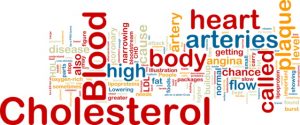 We all know that having high cholesterol is bad. It can have a serious impact on the heart. However, cholesterol isn’t just the heart’s problem. In fact, high cholesterol can affect your health in many ways, which is why it’s important to ensure that your LDL levels (bad cholesterol) are in check.
We all know that having high cholesterol is bad. It can have a serious impact on the heart. However, cholesterol isn’t just the heart’s problem. In fact, high cholesterol can affect your health in many ways, which is why it’s important to ensure that your LDL levels (bad cholesterol) are in check.
Our body actually requires cholesterol to function, but when LDL levels become higher than our HDL levels, a problem arises. Below you will uncover some other serious health problems that are associated with high cholesterol which you may or may not have been aware of before.
Advertisement
For most adults, total cholesterol numbers of less than 200 milligrams per deciliter are considered healthy. A borderline high reading is between 200 and 239 mg/dL. Total cholesterol over 240 mg/dL is considered high cholesterol.
Ideal LDL cholesterol levels should be below 100 mg/dL and a reading of less than 40 mg/dL for HDL cholesterol is considered a major risk factor for heart disease. Ideally, you want HDL levels to be over 60 mg/dL and always higher than your LDL cholesterol.
Health Problems Caused by High Cholesterol
As you know, having high cholesterol is problematic as it contributes to other health complications, primarily those that affect the heart. Here are some more specific negative health outcomes that can result from having high cholesterol levels.
Atherosclerosis
A potentially serious artery condition can arise from high cholesterol known as atherosclerosis. This condition causes the arteries to become stiff and hard because of built-up plaque that lines the arteries. Arteries need to be flexible so that blood can move freely through them. When they stiffen, the pressure at which the blood hits the arterial walls is increased, contributing to high blood pressure — another serious health problem on its own.
Atherosclerosis can also limit the amount of blood that passes through the arteries. The organs that require an ample blood supply start to become starved of oxygenated blood, leading to organ failure. Clogged arteries increase the risk of a blood clot, which can also limit blood flow to essential organs like the heart and brain. In some situations, a blood clot can become deadly if it travels through the body, causing a more serious blockage.
Heart Attack and Stroke
High cholesterol can also cause a heart attack. When the heart can’t receive blood, a heart attack occurs. Heart attacks are medical emergencies and can be life-threatening if not treated right away. It’s important that you recognize the signs and symptoms of a heart attack to spot one early. The earlier you get treatment, the better chance you have of surviving.
You also may be more prone to having a stroke. A stroke occurs in the brain when blood supply is cut off. Strokes can be life-threatening or can leave a patient with lifelong disabilities and challenges.
Peripheral Arterial Disease
Peripheral arterial disease (PAD) is also caused by high cholesterol. PAD can occur without presenting any symptoms, or the patient may experience an intense pain in their leg that goes away after rest. Symptoms include brittle toenails, weakness, numbness in the legs, erectile dysfunction, and hair loss.
Vision Problems
Studies have looked at the relationship between high cholesterol and vision problems and have found that high cholesterol may contribute to retinal vein occlusion, which is a condition that causes sudden blindness. This condition occurs because plaque buildup in the arteries prevents blood flow to the eyes. The optic nerve becomes negatively impacted by this reduced blood flow, and the end result is sudden vision loss.
Another vision problem associated with high cholesterol is corneal arcus. The eye will reveal whitish, gray, or yellowish deposits associated with high cholesterol. This colored ring appears around the retina and is related to diabetes and high blood pressure. The main course of treatment for corneal arcus is controlling cholesterol levels.
High cholesterol can also lead to xanthomas — yellowish bumps that appear on the skin and, in some cases, on the eye. Normally, xanthomas aren’t harmful but can lead to disfiguration. In some cases, the yellowish bumps burst, which require medical attention immediately.
Stomach Pain
Stomach pains can result in extreme cases of high cholesterol. Fatty deposits can occur within the ligaments, skin, liver, and spleen. This may result in an enlarged liver or spleen which puts pressure on surrounding organs, like the stomach.
Erectile Dysfunction
Advertisement
For an erection to occur, you need proper blood flow going to the penis. Cholesterol can line the arteries, causing them to become narrow, reducing blood flow to the penis. If the penis can’t get enough blood flow, then it is more difficult to obtain an erection. Furthermore, having high cholesterol can reduce the release of certain chemicals in the body required to have an erection.
As you can see, living with high cholesterol can be dangerous to your health in several ways. It’s important that you try and reduce your LDL levels as much as possible. Lifestyle changes may help you reduce your cholesterol. These include eating well and reducing stress. Needless to say, it’s important to keep your cholesterol levels in check if you want to live a long and healthy life.
Related: VLDL cholesterol: Tests, function, and home remedies
